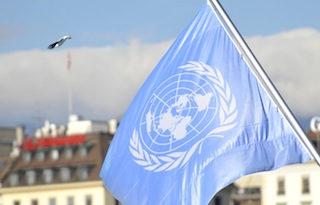In 1998, after 14 years of ISHR lobbying, advocacy and negotiation, the UN General Assembly adopted the landmark Declaration on Human Rights Defenders.
The adoption of the Declaration was a critical point in human rights history – and a proud moment for ISHR – because it recognised in international law the extreme importance and legitimacy of human rights activity, and the need to protect it along with those who carry it out.
What does the Declaration say?
Also known as the United Nations Declaration on the Right and Responsibility of Individuals, Groups and Organs of Society to Promote and Protect Universally Recognized Human Rights and Fundamental Freedoms, the Declaration defines a human rights defender as anyone working for the promotion and protection of human rights. This broad definition encompasses professional as well as non-professional human rights workers, volunteers, journalists, lawyers and anyone else carrying out, even on an occasional basis, a human rights activity.
The Declaration articulates existing human rights in a way that makes it easier to apply them to the situation of human rights defenders. It specifies how the rights contained in the major human rights instruments, including the right to freedom of expression, association and assembly, apply to defenders. It also outlines the specific duties of States and the responsibility of everyone with regard to defending human rights.
The rights protected under the Declaration include:
- the right to be protected;
- the right to freedom of assembly, and of association;
- the right to develop and discuss new human rights ideas and to advocate for their acceptance;
- the right to criticise government bodies and agencies and to make proposals to improve their functioning;
- the right to provide legal assistance or other advice and assistance in defence of human rights;
- the right to unhindered access to and communication with non-governmental and intergovernmental organisations, and international bodies;
- the right to access resources for the purpose of protecting human rights, including the receipt of funds from abroad.
Where are we at today?
In 2000, the UN took a positive step by establishing a specific mandate on human rights defenders (now known as the Special Rapporteur on Human Rights Defenders), to help monitor and press for the implementation of the Declaration.
The bad news is while the Declaration puts a responsibility on States to implement and respect all of its provisions, particularly the duty to protect human rights defenders from harm as a consequence of their work, in reality many States are still failing to do so.
Authoritarian governments restrict civil society, suppress dissent, and refuse to respect human rights laws. When criticised for doing so, they jail, harass, disappear, torture and even murder those human rights defenders who stand up in protest.
Part of the problem is that neither States nor human rights defenders are sufficiently familiar with the Declaration. The UN expert on human rights defenders’ Commentary to the Declaration was developed to help address this issue and is a good source of additional information on the subject.
ISHR believes the situation for human rights defenders has to change, and there is an urgent need to translate the promise of the Declaration on Human Rights Defenders into a reality. Much of our work is focused on achieving this. Find out more about what we do here.
If you’d like to be part of supporting the men and women who risk their lives by challenging authority, exposing violations and campaigning for global human rights change, you may like to donate to ISHR’s work.
Source: this page contains excerpts from ‘Human Rights Defenders: Protecting the Right to Defend Human Rights’, Fact Sheet No. 29, Office of the United Nations High Commissioner for Human Rights.




